Adrian Collins's Blog, page 168
July 19, 2021
REVIEW: The Offset by Calder Szewczak
In humanity’s desperate attempt to control overpopulation and stifle procreation, a drastic policy called The Offset is implemented. On this dying planet, having a child requires the greatest sacrifice and their child must live with the heaviest burden. Upon their eighteenth birthday, the child alone must decide which parent must be executed. Perhaps containing more truth than fiction, The Offset by Calder Szewczak is a science-fiction novel for our era.
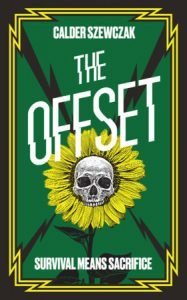 The Offset presents a dystopian world turned apocalyptic. Throughout the novel, we are gradually informed of why the world is near uninhabitable. I became almost morbidly fascinated. I had to know what happened. My curiosity had me quickly turning its pages. How could everything turn out so…wrong? To my horror, it was not one single event, but a sequence. Events that sound too familiar to what Earth faces now. The Offset is eerily like the book Nineteen Eighty-Four for conservation.
The Offset presents a dystopian world turned apocalyptic. Throughout the novel, we are gradually informed of why the world is near uninhabitable. I became almost morbidly fascinated. I had to know what happened. My curiosity had me quickly turning its pages. How could everything turn out so…wrong? To my horror, it was not one single event, but a sequence. Events that sound too familiar to what Earth faces now. The Offset is eerily like the book Nineteen Eighty-Four for conservation.
Calder Szewczak blatantly showcases the disastrous impacts an unhealthy world has on society. Political polarization has manifested within the most intimate facet of the human experience. With the fate of the world so uncertain, can having a child truly be considered an act of love? Anti-natalism, the ethical view that humans should sustain from procreating, has become a prominent ideology. For some, giving birth is not only selfish but sinful. Undertaking the offset is not only necessary for survival, it is an act of atonement. In many ways, The Offset is a stark forecast of our future.
While its message is worldly, The Offset follows the narrative of one family. Miri is nearing her eighteenth birthday and must decide which of her parents, Jac or Alix, will be offset. Calder Szewczak did a brilliant job with all three characters. Their vastly different and powerful perspectives are equally presented. Miri’s strong anti-natalism viewpoints and resentment contrasts sharply with her parents’ undeniable love for their daughter. I found myself switching back and forth between whom I identified with most. I couldn’t categorize their thoughts as right or wrong. I only felt each of their pain.
The Offset is a powerful novel from duo writers Natasha Calder and Emma Szewczak. While not needlessly violent, it is a tense read with zero reservations. Its unrelenting somberness became infectious and carries past the last page. This book introduces many questions and left more unanswered. What will become of this world? What happens to Miri? Our own future likely holds those answers.
Read The Offset by Calder Szewczak
The post REVIEW: The Offset by Calder Szewczak appeared first on Grimdark Magazine.
The Offset by Calder Szewczak
In humanity’s desperate attempt to control overpopulation and stifle procreation, a drastic policy called The Offset is implemented. On this dying planet, having a child requires the greatest sacrifice and their child must live with the heaviest burden. Upon their eighteenth birthday, the child alone must decide which parent must be executed. Perhaps containing more truth than fiction, The Offset by Calder Szewczak is a science-fiction novel for our era.
 The Offset presents a dystopian world turned apocalyptic. Throughout the novel, we are gradually informed of why the world is near uninhabitable. I became almost morbidly fascinated. I had to know what happened. My curiosity had me quickly turning its pages. How could everything turn out so…wrong? To my horror, it was not one single event, but a sequence. Events that sound too familiar to what Earth faces now. The Offset is eerily like the book Nineteen Eighty-Four for conservation.
The Offset presents a dystopian world turned apocalyptic. Throughout the novel, we are gradually informed of why the world is near uninhabitable. I became almost morbidly fascinated. I had to know what happened. My curiosity had me quickly turning its pages. How could everything turn out so…wrong? To my horror, it was not one single event, but a sequence. Events that sound too familiar to what Earth faces now. The Offset is eerily like the book Nineteen Eighty-Four for conservation.
Calder Szewczak blatantly showcases the disastrous impacts an unhealthy world has on society. Political polarization has manifested within the most intimate facet of the human experience. With the fate of the world so uncertain, can having a child truly be considered an act of love? Anti-natalism, the ethical view that humans should sustain from procreating, has become a prominent ideology. For some, giving birth is not only selfish but sinful. Undertaking the offset is not only necessary for survival, it is an act of atonement. In many ways, The Offset is a stark forecast of our future.
While its message is worldly, The Offset follows the narrative of one family. Miri is nearing her eighteenth birthday and must decide which of her parents, Jac or Alix, will be offset. Calder Szewczak did a brilliant job with all three characters. Their vastly different and powerful perspectives are equally presented. Miri’s strong anti-natalism viewpoints and resentment contrasts sharply with her parents’ undeniable love for their daughter. I found myself switching back and forth between whom I identified with most. I couldn’t categorize their thoughts as right or wrong. I only felt each of their pain.
The Offset is a powerful novel from duo writers Natasha Calder and Emma Szewczak. While not needlessly violent, it is a tense read with zero reservations. Its unrelenting somberness became infectious and carries past the last page. This book introduces many questions and left more unanswered. What will become of this world? What happens to Miri? Our own future likely holds those answers.
Read The Offset by Calder Szewczak
The post The Offset by Calder Szewczak appeared first on Grimdark Magazine.
July 18, 2021
An Interview with Paul Tremblay
Paul Tremblay has won the Bram Stoker Award, British Fantasy, and Massachusetts Book awards for his work in the horror field. His novels horror novels include The Cabin at the End of the World, Disappearance at Devil’s Rock, A Head Full of Ghosts, Survivor Song, and the story collection Growing Things. He is also a crime novelist with the Mark Genevich series.
Paul was kind enough to sit down with me for the crossover issue of Grimdark Magazine and chat about the horror genre in general, the unreliable narrator in horror, and his newest novel, Survivor Song.
[GdM] You have a master’s degree in mathematics from the University of Vermont. How did you get from mathematics to writing? Are there creative similarities between the two?
[PT] One of the last classes I took as an undergraduate was an English/Lit 101 kind of class to fulfill a humanities requirement. That class and Joyce Carol Oates’s story “Where Are You Going? Where Have You Been?” sparked a little pilot light of reading in me. A few months later, Lisa (my wife), bought me The Stand by Stephen King for my birthday, which ignited that pilot light into a flame in a furnace. (Um, work with me, here.) Yeah. Anyway, I went off to UVM, and in my free time I read all the King books I could get my hands on. From there I branched out to Peter Straub, Shirley Jackson, Clive Barker, and more. After two years, I earned my master’s by the skin of my teeth, but I also had an inexplicable itch to try writing some short stories.
Higher levels of mathematics require creativity. I never got there, though, in math. That said, I think my math background helps with some of the analytic aspects of writing, my constantly asking questions of the story and their characters, sort of like programming in a binary 0 or 1 language. Every choice you make in a story is a 0 or a 1 and it leads to the next choice and the next.
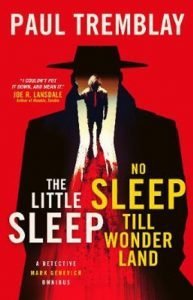 [GdM] Two of your first novels, The Little Sleep and No Sleep until Wonderland, feature a narcoleptic detective, Mark Genevich. The stories have been described as hardboiled crime noir. What inspired these? Are you a fan of hardboiled crime stories like Dashiell Hammett and Raymond Chandler?
[GdM] Two of your first novels, The Little Sleep and No Sleep until Wonderland, feature a narcoleptic detective, Mark Genevich. The stories have been described as hardboiled crime noir. What inspired these? Are you a fan of hardboiled crime stories like Dashiell Hammett and Raymond Chandler?
[PT] While my first and foremost love is horror fiction, I am a fan of noir/hardboiled, particularly Raymond Chandler, but also Sara Gran, Will Christopher Baer, and Liz Hand’s Cass Neary series. The Little Sleep started with an image of a big city PI in his office and a beautiful woman walks in—the stereotype of a detective story—but her case is bizarre. She holds up a hand and bandages are wrapped around the bases of her fingers. She says someone stole her fingers and replaced them with someone else’s. When I first had the idea, I thought I would do a PK Dick kind of noir story, but didn’t get anywhere with it. Later, when I researched sleep disorders (I had an acute sleep apnea that resulted in surgery) and stumbled across narcolepsy and hypnagogic hallucinations, I knew the woman’s fingers weren’t really stolen and my PI was dreaming. The books spooled out from there, with Mark himself being the ultimate mystery of the novels.
[GdM] Who is P.T. Jones? How did you arrive at that nom de plume?
[PT] That guy owes me money!
Stephen Graham Jones and I co-wrote a now out-of-print YA novel called Floating Boy and the Girl Who Couldn’t Fly. It’s SF/F or F/SF (depending upon how shoddy you think our science was). It was an absolute pleasure to work with Stephen, who is kind and generous and beyond talented and hard-working. At the end we decided to Brundlefly our names into P. T. Jones and let that guy take all the blame.
[GdM] Your books have a way of leaving the reader unsettled. There is nothing straightforward about how the stories take place. Have you always been drawn to horror that leaves you questioning your interpretation of things?
[PT] Thank you, and the short version: yes!
Memory, identity, and reality are more malleable than we like to think they are, and I’m fascinated by those cracks within things and within us; those liminal spaces our imagination and hope and fear try to fill. Existence itself is ultimately ambiguous, right? Or at least its end is: what happens when/after we die? You can think you know or believe you know, but you (me included) don’t and can’t really know. I think most horror stories poke and probe at that final unanswered question, even without having to directly ask it.
[GdM] Your novels have a very intimate nature to storytelling. Rather than the grandiose big picture, you tell stories that look into a smaller section of humanity. It is a doctor trying to help pregnant women during an outbreak, two loving fathers facing tough choices, or a reality television show of a family who is possibly descending into madness. What attracts you to such intimate stories versus writing something more all-encompassing?
[PT] The all-encompassing thing intimidates me as a writer, frankly.
As a reader, I connect with more personal stories. Even for a math person like me, the numbers can become too big, too faceless, too numbing in scope. Focusing on one person or one household’s story often grounds or humanizes an event. Or maybe put in another way, all our stories are small, and I mean that in an intimate, humbling, and beautiful way. The awe and horror of the world is how we’re fated to be continually caught within the gears of events beyond our control. And, so, now what? No really, I want to know. What do you do now? What does one person do when they’re caught in the middle of the maelstrom, whether the maelstrom be a super rabies outbreak, economic disaster, zealot-eyed home invaders, or even the cruel will of the universe. I find both horror and hope in those individual stories.
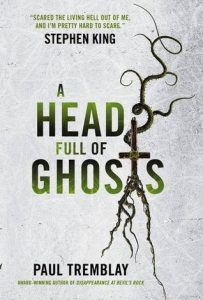 [GdM] Two of your novels are being adapted to film, Cabin at the End of the Woods, and Head Full of Ghosts. How do you feel knowing that your stories are being made into another medium?
[GdM] Two of your novels are being adapted to film, Cabin at the End of the Woods, and Head Full of Ghosts. How do you feel knowing that your stories are being made into another medium?
[PT] When the novels were first optioned it was very exciting of course, and it remains exciting. But. Also. There’s a lot of waiting. Most optioned things don’t get made. Like mine won’t get made. But I hope they do. Unless the films are bad, then ask me this question again. I joke (mostly). I’m cautiously optimistic. In the case of A Head Full of Ghosts, which is a book about influence and the horror genre, I’m excited to see what someone else’s interpretation or twist on that story would be. For Cabin, my hope is the prospective filmmaker(s) hew closer to the text, as I imagined the book as a stage play when writing it. I feel very protective of some of those characters.
[GdM] Tell me about the Barretts from Head Full of Ghosts. Their predicament was scary as hell.
[PT] It was my hope that readers would find the Barretts to be flawed but tragic and humane figures. The story is told from the point of view of the youngest daughter, Merry. She was eight years old when her parents allowed a reality TV crew to document an attempted exorcism of Marjorie, who is fourteen, and exhibiting symptoms of schizophrenia. John and Sarah were desperate enough economically to say yes to the show and the exorcism. The novel is a mix of family drama and ambiguous horror.
For so many of us, the childhood realization that your parents aren’t in control, cannot always keep you safe, and do not know what is best for you in every situation is a horrifying but human discovery. I think that’s partly why family drama mixes with horror so well.
[GdM] In Head Full of Ghosts, there is a doubt, a psychological horror that pervades the novel. Do we know what we think we know? It keeps the readers off-balance. Are there other books that influenced you in this style of storytelling?
[PT] I already mentioned the story “Where Are You Going, Where Have You Been?” and it’s a brilliant ambiguous story dripping with dread and menace. Specific to A Head Full of Ghosts, two novels that inspired my main characters Marjorie and Merry were Speed Queen by Stewart O’Nan and We Have Always Lived in the Castle by Shirley Jackson. Both novels dwell in a liminal space, but take very different approaches to the material.
Otherwise, I’m a sucker for novels/stories that skew and play with perspective and reality and ontology. Books like House of Leaves (Mark Danielewski) and Come Closer (Sara Gran).
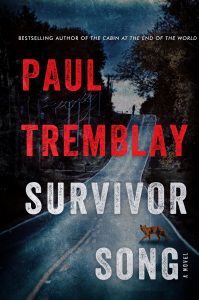 [GdM] You had a pandemic novel come out, Survivor Song, during an actual pandemic. What was that like? It had a lot of plot points in it that seemed almost prophetic.
[GdM] You had a pandemic novel come out, Survivor Song, during an actual pandemic. What was that like? It had a lot of plot points in it that seemed almost prophetic.
[PT] It was a strange experience to say the least. In the months leading up to the release I found myself apologizing to people who had read or would read the book, which was and is ludicrous, but that reflected the stew of fear and emotions I was dealing with, that all of us were dealing with.
Since I get asked a lot about the timing of finishing the book and pandemic: I turned in my final copyedits for the novel to my publisher in early November 2019. I think the parts that feel the most ‘prophetic’ are due to the information I gleaned from my sister, Erin. At the start of the novel, I wanted to learn what a local hospital’s response to an epidemic might look like, and I leaned on Erin, who is a nurse at one of the largest hospitals in Boston. Her experience with a brief (in the United States) brush of prepping for a possible Ebola outbreak in 2014 made it into my book in the form of a text exchange between nurses and Dr. Ramola Sherman. As far as forecasting that the Trump administration would be woefully unequipped to handle a pandemic and there being rampant misinformation regarding my fictional virus, I don’t think either was hard to predict. If anything, I underestimated the depths of ineptitude and how mainstream virus and now vaccine conspiracies would become.
[GdM] You chose rabies as the disease vector in Survivor Song. The infected reminded me of the dog in Stephen King’s Cujo. Did you do a lot of research into how rabies would affect the human body?
[PT] Yes, though most of the research was a happy accident prior to my having an idea for the book. When I walk my dog, I tend to listen to audiobooks, and at least a year before I had the idea for Survivor Song I listened to/read Rabid: A Cultural History of the World’s Most Diabolical Virus because, why not? I had no idea how awful and strange the virus was. All I knew (or thought I knew) was foaming mouths and giant needles jabbed into your stomach.
In July 2018 I had the what-if that sparked the novel. I can’t tell you the what-if because it spoils the book. But, I wanted to write a somewhat realistic zombie story, or zombie-adjacent story, and rabies fit the bill. I then re-read the rabies book and found gobs of rabies info online as well. Yes, I said ‘gobs.’
[GdM] Natalie and Ramola have an authenticity to their characters. You have a switching point of view between the two of them. However, most of Natalie’s character is shown through her recordings to her unborn child. Why did you choose to express Natalie’s character this way?
[PT] Thank you. I wanted the bulk of the story to be from Ramola’s point of view as I ultimately ask her character the most difficult questions of the book. I wanted to have some of Natalie’s voice and POV in there as well, but I didn’t want the two characters swapping chapters. I also didn’t want the responsibility of telling the readers what it felt like to be eight and a half months pregnant. I obviously don’t have any experience with that. Natalie’s recordings for her child aren’t about what is happening to her in the moment but are instead these intimate moments between a mother/parent and a child they haven’t met yet. I hoped the weight and import of those one-sided conversations would be meaningful to her character but also build suspense in a way, too.
[GdM] Natalie and Ramola’s story takes place in real-time, over 8 hours. What were the challenges of writing in this type of time frame?
[PT] The most challenging part was attempting to make each moment realistic and (hopefully) plausible, while balancing the action of the story with more quiet, reflective times. Also, trying (and likely failing) to keep the flashbacking to a minimum. Though when I did have flashbacks I wanted to keep them purely relevant to the moment in the story.
Most of the writing for me is a feel thing, honestly. I really don’t know what the hell I’m doing most of the time (don’t tell anyone), but I trust when it feels right.
[GdM] Finally, what are you reading right now? Have you read anything lately that was amazing?
[PT] I am currently listening to the audiobook Empire of Pain: The Secret History of the Sackler Dynasty by Patrick Radden Keefe. It’s about the Sackler family and the billions they’ve made in pharmaceuticals, most recently with creating and distributing and marketing Oxycontin. It’s harrowing, infuriating stuff. I’m also reading Twilight Zone by Nona Fernandez, a novel about the trauma of living in post-Pinochet Chile and it’s also quite harrowing. Later this summer, keep an eye out for Build Your House Around My Body by Violet Kupersmith. An epic, decade-hopping ghost story in Vietnam. My favorite of 2021 so far.
Interview originally published in GdM#27.
The post An Interview with Paul Tremblay appeared first on Grimdark Magazine.
July 17, 2021
REVIEW: Dredd (2012)
Dredd is a 2012 sci-fi action film written by Alex Garland (The Beach, 28 Days Later, Ex Machina, Annihilation) and stars the always amazing Karl Urban (Lord of the Rings, The Boys, Thor: Ragnarök) as Judge Dredd. It is based on the comic from 2000 AD created by John Wagner and Carlos Ezquerra and is the first time the character of Judge Dredd has appeared on screen since Sylvester Stallone’s portrayal in 1995.
 Dredd is a fine example of what happens when a comic book character is treated with respect and genuine care. In the dystopic wasteland of the Cursed Earth there lies a place known as Mega-City One. This violent city packed to the brim with too many inhabitants is rife with crime and it is up to the Judges to sort things out. Given an 18 or ‘R’ rating allows Dredd to bring the world of Mega-City One to life without holding back on the violence and grimness of the world that makes the comics so appealing to its core audience. The escalating madness of the Cursed Earth setting leads to the rise of more violent tactics from the judges and Dredd himself is a character not known for his mercy. He judges criminals to the letter of the law and dishes out the harsh justice expected by his bosses. Dredd takes an unusual but inspiring decision to place the entire story around one day on the job as Judge Dredd is tasked with taking on a rookie recruit with psychic powers – Cassandra Anderson – who marginally failed the aptitude test to become a Judge.
Dredd is a fine example of what happens when a comic book character is treated with respect and genuine care. In the dystopic wasteland of the Cursed Earth there lies a place known as Mega-City One. This violent city packed to the brim with too many inhabitants is rife with crime and it is up to the Judges to sort things out. Given an 18 or ‘R’ rating allows Dredd to bring the world of Mega-City One to life without holding back on the violence and grimness of the world that makes the comics so appealing to its core audience. The escalating madness of the Cursed Earth setting leads to the rise of more violent tactics from the judges and Dredd himself is a character not known for his mercy. He judges criminals to the letter of the law and dishes out the harsh justice expected by his bosses. Dredd takes an unusual but inspiring decision to place the entire story around one day on the job as Judge Dredd is tasked with taking on a rookie recruit with psychic powers – Cassandra Anderson – who marginally failed the aptitude test to become a Judge.
The unique premise of Dredd allows for a tight story full of action that feels ripped straight from the pages of 2000 AD. Dredd and Anderson investigate the deaths of criminals skinned alive by a local drug lord called ‘Ma-Ma’ (played by the sadistic and enthralling Lena Headey in the middle of her incredible run as Queen Cersei from Game of Thrones). Dredd and Anderson become locked in a multi-storey tower and must fight their way up the increasingly hostile setting with the residents either locking themselves away or taking up their own weapons and attempting to kill the Judge and his rookie ally under the orders of Ma-Ma. Dredd dishes out justice in the only way he knows how – using a variety of brutal death shots from his Lawgiver gun. There is no holding back with the blood and gore and it suits the material perfectly, creating a claustrophobic and tense setting as the two heroes fight to survive against the mounting odds.
The scenes in Dredd with Slo-mo, a new drug on the streets that gives the perception of time slowing down for the user, are beautifully shot and the interesting narcotic allows for some uniquely crafted action shots and gunfights to play out in the gritty, harsh environment of Mega-City One. Dredd himself marches through the chaos at his own pace, following the law and reluctantly dragging Anderson along for the ride. Dredd is an unusual character in that his development is unlike so many characters in other stories. He is a grim, dark enforcer of the law who does things as he believes they should be done. It is this stubborn attitude that Karl Urban plays to perfection and it turns even the slightest bending of the rules into a momentous, standout occasion as Dredd slowly begins to warm to his psychic and emotional rookie. Wearing his helmet at all times, Karl Urban makes Dredd feel like a film that is owed a nod of gratitude from the popular The Mandalorian. Body language and the subtlety of line delivery creates an imposing figure to carry the film across its relatively short run time. There is no wasted movement with Dredd and no wasted moments in the whole film.
Dredd is a near perfect sci-fi action film with an honest and brutal portrayal of a dark anti-hero that proves that there is no need to compromise when adapting gritty comics. This is a must-watch for grimdark fans with a love of sci-fi.
Watch Dredd (2012)
The post REVIEW: Dredd (2012) appeared first on Grimdark Magazine.
July 16, 2021
REVIEW: The Book of Accidents by Chuck Wendig
Wendig is a study of different types of horrors. If you haven’t read many Wendig books, Chuck writes with various styles and themes. Each one of his novels, whether horror or science fiction, approaches its theme originally. So, if I were to read passages from five different books blindly, I could not pull out a specific Wendig-type style. He is an expert at matching tone to the story.
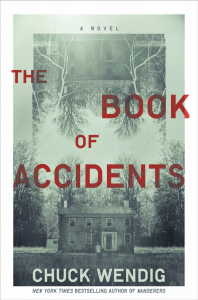 Also, I assume that Chuck is a reader, a man who appreciates the written word. I expect that, because he enjoys books as much as he does, it comes through in his storytelling.
Also, I assume that Chuck is a reader, a man who appreciates the written word. I expect that, because he enjoys books as much as he does, it comes through in his storytelling.
For instance, one of the earlier stories in his bibliography is the first book of the Miriam Black series, Blackbirds. Black is an alcoholic anti-protagonist who is cursed with the vision of the death of every person she physically comes into contact with. She is also brash and crude. The story is dark and twisty with a slight mystery element, but mostly it is about Miriam trying to survive in a world that hates and reviles her. She reminded me a lot of a much darker Jessica Jones-type character, written with a specific tone of roughness and desperation.
Another of my favorite books that I have read in the last five years is Wendig’s Wanderers. It is an epic horror survival story, which is often compared to Stephen King’s The Stand. Again, excellent writing skills. When I read it, I could not say that it was a Wendig book, unlike a Stephen King book, which I could pick out in three pages.
All this brings me to The Book of Accidents, which seems very much like an amalgamation of various styles siphoned and condensed down into a gothic horror novel that touches on many of the cornerstones of horror. The Book of Accidents effectively has elements of preternatural horror, body horror, psychological, some apocalyptic, Lovecraftian, and even psycho-killer-style scenes. Wendig distilled the virtues of each of the horror disciplines down to an incredibly atmospheric read that even now, thinking about it, I know that I did not catch every little nuance, and it deserves a second read.
The story starts with Nate Graves back in his hometown, following the death of his abusive father. Nate, his wife Maddie, and their son Oliver move into Nate’s childhood home. A home full of memories, mostly bad ones. Those previous traumatic memories haunt Nate as if they are ghosts. Oliver is an empath. He instinctually feels the pain of those around him. The less pain and slower rural lifestyle that the family is hoping for is meant to help Oliver deal with his abilities. However, Wendig describes that even smaller, more rural towns are full of horrors, just like big cities.
As the story progresses, Nate slowly begins to succumb to his brutal past and the PTSD of his childhood. He sees things that are not there; he has bouts of anger and depression. Maddie also has difficulties adjusting to life in this small town. She blacks out while chain-sawing a wood sculpture, and her creations come to life. At this point in the story, it is difficult to tell what is real and what could be a psychological breakdown from stress. However, Maddie is the glue that holds the family together. As her ability to deal with the reality of the events before her diminishes, she has difficulty coping, which begins to fracture the family.
The Book of Accidents plays on the horrors of the mind and the horrors of the unknown, but much more importantly, it is a story about family and the invisible ties that bind individuals to each other and their past events. Nate has a great fear of passing the violence of his childhood on to Oliver through his actions. And in turn, Oliver senses the turmoil inside his father.
Oliver has a difficult time adjusting to school life. He eventually makes friends with other like-minded kids but runs into conflict when one new friend, an older boy named Jake, causes problems in Oliver’s relationships. But from the get-go, readers pick up that Jake is more than meets the eye.
Wendig takes all of these bits and pieces of horror and conflict and creates a cohesive narrative that culminates in many jaw-dropping moments. It jumps from serial killers, dark and evil books, demons, ghosts, and even science fiction elements. If I were to tell you more, it would spoil the surprises. Oddly enough, in any other hands, this book would be an incohesive mess. But it all works. The serial killer angle and his disappearance moments before death, the psychological pain of Oliver’s classmates, what Maddie does to make sure that they all survive… it all works, and not for one moment does this book let up. It is like a symphony starting with many discordant and uncomfortable notes that come together so fully the force of the cacophony nails you to your chair.
The Book of Accidents is another fantastic horror novel to add to Wendig’s already impressive repertoire. It is a book of shock and pain and the thin grey line between good and evil. It touches on family and relationships as much as the supernatural. He grinds it all together in a blender and what comes out is a hard-hitting story. It is an excellent book that will appeal both to readers who are new to Wendig’s catalog and those of us who have read many of his stories. Go check it out.
Read The Book of Accidents by Chuck Wendig
Originally published in GdM#27
The post REVIEW: The Book of Accidents by Chuck Wendig appeared first on Grimdark Magazine.
July 15, 2021
An Interview with Chuck Wendig
Chuck Wendig is a New York Times and USA Today best-selling author, both non-fiction and novels. His recent books include Wanderers, which is a Locus, Bram Stokers, and Goodreads award Nominee. As well as the series Miriam Black, Force Awakens, the Invasive Duology. You can find him on his blog Terribleminds or his Twitter account @wendig, where he might be talking about writing, birds, apples, or sandwiches, depending on the season.
Chuck was kind enough to chat with me about his writing and his upcoming horror novel, The Book of Accidents.
 [GdM] Reading your stories, I have noticed that you don’t do a lot of worldbuilding. You establish a setting and go, or maybe jump right in as you did with Wanderers because [gestures around] the scene is pretty much already set. Is that a conscious choice or how the words flow out of you creatively?
[GdM] Reading your stories, I have noticed that you don’t do a lot of worldbuilding. You establish a setting and go, or maybe jump right in as you did with Wanderers because [gestures around] the scene is pretty much already set. Is that a conscious choice or how the words flow out of you creatively?
[CW] Worldbuilding is something I love very much, coming from a roleplaying game background (both playing and writing) but it also can be an anchor that drags a story down—I do as much worldbuilding as is ideally needed to get to the next section of the book. It’s a bridge, in many ways. Not to say you can’t or shouldn’t build other pieces of glorious architecture. Every book is different, and I don’t think every story needs to be mercilessly screaming WELL THIS MUST SERVE A POINT OR YOU WILL BURN IT DOWN. But for my mileage I do prefer to focus more on the characters, and through them, worldbuilding is revealed.
[GdM] As someone who is deathly afraid of ants, I read Invasive because apparently, I enjoy creeping myself the hell out. One of the first lines of my review was “Chuck Wendig, you are a maniac.” Why ants?
[CW] Ants are awesome and weird, that’s why. Like bees, they are eusocial, and have behaviors that are both individual and group-based—I’ve always been interested in them. In fiction form they also make a nice metaphorical stand-in for anxiety.
[GdM] Wanderers is an epic story. When you sat down to write it, did you have any idea the depth of scope it was going to cover? Or did you always know that it was going to be a huge story?
[CW] I knew it was huge, but mayyyyyybe not 280,000 words huge.
[GdM] What kind of research did you do for Wanderers? While we did not have a great sleepwalking plague of 2020, there are certain similarities between the governmental response in the face of a health crisis and how things played out in your novel. Wanderers was remarkably prescient. Especially the Black Swan AI versus Blue Dot AI.
[CW] I’m a lazy writer, and much of the research for the book was not done for the book, but was rather just stuff I read that I found interesting. A lot of the prescient stuff wasn’t particularly insightful or prophetic on my part—it’s not like we didn’t know pandemics could happen or that white supremacy was a problem. But the Black Swan / Blue Dot thing was hahaha yeah, that was a little freaky.
 [GdM] Tell me a bit about your newest book, The Book of Accidents. It seems like a complicated horror story to sum up with a small blurb. A lot is going on. Off the top of my head, I can think of a few of the different horror types in it: Lovecraftian, paranormal, post-apocalyptic, psychological, and serial killers, all as part of the narrative. As the author, how would you describe it to prospective horror readers?
[GdM] Tell me a bit about your newest book, The Book of Accidents. It seems like a complicated horror story to sum up with a small blurb. A lot is going on. Off the top of my head, I can think of a few of the different horror types in it: Lovecraftian, paranormal, post-apocalyptic, psychological, and serial killers, all as part of the narrative. As the author, how would you describe it to prospective horror readers?
[CW] A lot is going on, indeed. It starts simple, as a family moving to a haunted house that was once the home of the father, a home of abuse and trauma. And from there, it certainly goes places. I like to focus on the family aspect: What happens when your family is at the center of great evil? How do they survive? How do they help each other? They are haunted by not only apparent specters, but also by generational trauma and cycles of abuse, and how do you break that circuit? How do you exorcise that kind of evil?
[GdM] One of the central parts of the story is the dynamics of family and the effect family can have on someone for good or evil. The story rang with authenticity, especially the scenes depicting familial violence. What kind of research did you do to portray the characters so accurately?
[CW] No real research there—I have my own family and grew up in a haunted house, so I had enough idea ammunition for this. It’s a very personal book.
[GdM] When you were writing The Book of Accidents and wading into the kind of horror and darkness described in the story while writing during a pandemic with the horror and darkness in the real world, how did you shake it off?
[CW] I wrote this before the pandemic, actually (though edited it during). We originally were going to release this book in October of 2020, but before the pandemic the publisher (wisely) opted to move the date—not, in fact, because of prophesying the pandemic but because there was going to be a huge, tumultuous election at that time and it would be hard to get traction with media attention for a book. And then, as it turned out, there was TOTALLY a global pandemic so I’m pretty glad we didn’t release then. (We are still of course in that pandemic, but it’s certainly an easier, calmer time.)
[GdM] How do you separate yourself when writing such complex themes during such a difficult time like 2020?
[CW] I don’t really separate myself? I’m writing a book for a reason and that reason is personal, so I don’t try to give myself great distance from the work. Especially in first drafts.
[GdM] Talking about horror stories in general, I found The Book of Accidents dark but not bleak. It treads the line bringing you to the brink of despair only to have a small glimmer of hope to grab on to in the distance. Do you find that to be an essential aspect while writing horror in general?
[CW] That’s usually my aim—dark, but not bleak. There’s enough despair in this era, and I’m not interested in adding to it. Just the same, I feel like horror fiction helps us contextualize real-world horror. I often compare it to how a sorcerer creates a summoning circle in which to conjure demons: that circle is a safe place to fight those monsters, and that’s horror fiction to me. It’s a safe place to fight monsters.
[GdM] Finally, I would love to know what you’re reading and what books you are excited about in 2021?
[CW] I just read Christopher Golden’s Road of Bones and it’s fucking legit, stellar “adventure horror” that just fires up my readerly happiness. Always excited for new Stephen Graham Jones. New Caitlin Starling, too. Kiersten White’s debut with Del Rey. Delilah Dawson’s The Violence. C’mon. This is a great time to be a horror reader.
Read The Book of Accidents by Chuck Wendig
This interview was originally published in GdM#27.
The post An Interview with Chuck Wendig appeared first on Grimdark Magazine.
July 14, 2021
REVIEW: Van Richten’s Guide to Ravenloft
Van Richten’s Guide to Ravenloft, the latest Dungeons and Dragons 5th edition supplement, takes players and gamemasters on a journey through the gothic fantasy Domains of Dread. Presented as a campaign handbook to this misty and macabre sub-dimension of the Shadowfell, it includes new character creation options, Ravenloft lore and setting customization tools, tips for using various subgenres of horror at the table, and some thematic additions to the Monster Manual. To those unfamiliar with the setting, this supplement is fantasy in the vein of Netflix’s Castlevania, Magic: The Gathering’s Innistrad set, and the Van Helsing and Dracula Untold movies. While this book does focus on the same realm (and beyond) that the popular 2016 Curse of Strahd campaign does, it’s not a sequel and reading/playing Strahd is not necessary (though it’s an amazing module and well worth playing).
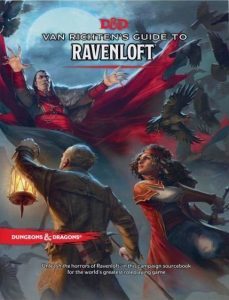 After a neat introduction with some epistolary content to and from monster hunter Rudolph Van Richten himself, the book launches into spooky character creation options. These include new playable races like the undead reborn, the semi-vampiric dhampir, and the hag-influenced hexblood as well as a new bard and warlock subclass. My favorite bit of this chapter is the ‘Dark Gifts’ mechanic it introduces. Players can gain these double-edged powers through Faustian bargains, familial curses, or similar events, and each offers potentially great fodder for roleplaying. One cool Dark Gift, for instance, is ‘living shadow,’ where a character’s shadow becomes an independent entity that’s both helpful to the PC and a potentially sinister being with its own agenda that’s always following closely behind them. While the material in this section is top-notch, it does feel a little skinny since it contains nearly all of the player-oriented content in the book. With the following chapters focusing more on dungeon masters, players might find themselves wanting a little more to justify the $30-$50 price tag of this book, and I feel like there was room here for an extra subclass or two or some new Ravenloft-based spells or feats.
After a neat introduction with some epistolary content to and from monster hunter Rudolph Van Richten himself, the book launches into spooky character creation options. These include new playable races like the undead reborn, the semi-vampiric dhampir, and the hag-influenced hexblood as well as a new bard and warlock subclass. My favorite bit of this chapter is the ‘Dark Gifts’ mechanic it introduces. Players can gain these double-edged powers through Faustian bargains, familial curses, or similar events, and each offers potentially great fodder for roleplaying. One cool Dark Gift, for instance, is ‘living shadow,’ where a character’s shadow becomes an independent entity that’s both helpful to the PC and a potentially sinister being with its own agenda that’s always following closely behind them. While the material in this section is top-notch, it does feel a little skinny since it contains nearly all of the player-oriented content in the book. With the following chapters focusing more on dungeon masters, players might find themselves wanting a little more to justify the $30-$50 price tag of this book, and I feel like there was room here for an extra subclass or two or some new Ravenloft-based spells or feats.
Chapters two and three make up the manticore’s share of the book, and both focus on worldbuilding. The former is a toolkit for dungeon masters to design their own demiplanes in Ravenloft, and the latter is a breakdown of 20+ established Domains of Dread. These sections are significantly more fluff than crunch (no special statblocks for Darklords if any DMs were hoping for them), but they’re definitely my favorite portion of the book. Both chapters employ subgenres to great effect, giving tips for DMs using cosmic horror, folk horror, dark fantasy, etc. in their own worlds and tagging iconic sub-dimensions of Ravenloft with the same tropes. Some Domains in chapter 3 that particularly stood out to me were Bluetspur (an alien abduction-inspired plane of mindflayers toiling in city-labs and serving a decaying God-Brain), Falkovnia (a disaster horror plane ruled by a ruthless mercenary general whose lost soldiers, slain foes, and slaughtered innocents return eternally in an undead horde), and Lamordia (a steampunk Frankenstein-inspired word of body horror and immoral experimentation). If you’re running a Ravenloft campaign (and this book definitely made me want to), this information is invaluable. If your game takes place in another setting, it’s still a fun read for anyone interested in inventive dark fantasy worldbuilding, and a lot of the concepts presented here could be chopped up and reused by any DM with a taste in the macabre.
Chapter four focuses on running horror adventures and opens with pre-session tips on setting player boundaries/expectations, creating atmosphere, and using tension and pacing. The section also offers more mechanical horror tools like new rules for curses, haunted traps, an alternative fear/stress system, and creating powered-down ‘survivors’ (temporary and oft-doomed character stand-ins focused on survival rather than heroism). The chapter finishes out with a ready-to-play adventure called the “House of Lament” that can act as the first chapter of a Ravenloft campaign and has a really cool “Cask of Amontillado” flavor. The module seems like a great introduction to a longer game in the Domains of Dread or a Halloween one-shot, and the Darkest Dungeon player in me especially appreciates the updates this chapter offer to the fear/stress system first presented in the Dungeon Master’s Guide.
Chapter five wraps up the book with a menagerie of new creatures native to Ravenloft and their accompanying statblocks, as well as their background lore and tips for making horror encounters genuinely scary. This chapter presents some neat variations on classic monsters (living dolls, the vampiric nosferatu, the lycanthropic loup-garou, etc.) as well as some that are new to 5e. One encounter I’m keen to run at my own table is the Nechrichor–a malevolent sentient ooze made from the sludge of an aborted lich or the foul ichor of a dark god.
In summary–is this particular D&D 5e supplement for you? If you’re a dungeon master running a horror or dark fantasy campaign in Ravenloft or a similar homebrew setting (and I imagine many DMs reading this magazine will be), the book is an absolute must-read. Those playing games in brighter and more traditional high fantasy settings can also find material to use here, though probably not quite as much. The monsters in chapter five can slot well into most campaigns, and many of the Darklords in chapter three could be used as inspiration or re-written as custom antagonists. For non-DM players, the choice to buy this one is a little less cut and dry. The new races and character creation options are top-notch, but they do make up a relatively small portion of the whole. The book’s hints on creating backstory for characters from each Domain of Dread are also really cool, but probably only applicable if you’re playing a campaign specifically in Ravenloft.
For those who fall into any or none of the categories above and are simply interested in the lore or keen on the places where horror and fantasy meet, Van Richten’s Guide to Ravenloft is definitely worth the price tag. The tragic and haunted sub-planes and fascinating villains in chapter three present some awesome worldbuilding, and they’re entertaining enough to read on their own even if you removed them from the context of the game itself. In terms of production value, it almost goes without saying that a D&D book is lavishly illustrated, but I particularly appreciate the art in this one. Nearly every Domain gets its own full-color minimap, and there are some killer full-page pieces of iconic characters like Count Strahd and the lich Azalin Rex. All in all, this book has earned a place among my favorites in the 5th edition line, and it’s helping me cook up some especially horrific adventures for my players to enjoy in the future.
Play Van Richten’s Guide to Ravenloft
The post REVIEW: Van Richten’s Guide to Ravenloft appeared first on Grimdark Magazine.
July 13, 2021
Crossing the Monster
The best monsters are not ‘other’, or ‘different’, or ‘damaged’, but those that exploit our fears and our own flaws. The creatures that make us think of death, loss, drastic unasked for change, loss of control, irreparable damage.
Both science fiction and horror address these things, often using the monster as a way in. Science fiction monsters are based in a form of reality. They could almost be true, given circumstances. Horror monsters are dark, unflinching, nightmarish, unthinking, immoral, terrifying.
These things can be stronger if drawn together.
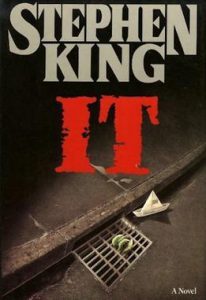 Classic horror monsters include Joe R Lansdale’s Folding Man from “The Folding Man” short story; Jeffrey Ford’s Daddy Long Legs in the Evening from the story of the same name, and of course Stephen King’s Pennywise. All three of these creations tap into our deepest fears, and explore what it is to be changed by them.
Classic horror monsters include Joe R Lansdale’s Folding Man from “The Folding Man” short story; Jeffrey Ford’s Daddy Long Legs in the Evening from the story of the same name, and of course Stephen King’s Pennywise. All three of these creations tap into our deepest fears, and explore what it is to be changed by them.
Classic SF monsters for me include the aliens in HG Wells’ War of the Worlds, those bloody sandworms in Frank Herbert’s Dune, Peter Watts’ evolved vampire in Blindsight and Simon Kress, the utterly awful ‘animal lover’ in George R R Martin’s “Sandkings” novella.
Monsters are particularly important in both sf and horror, genres in which we investigate human behaviour and motivations, look at why people do the things they do, and try to imagine what will happen if they keep doing them. Fears are there to be explored and exploited: In Jeffrey Ford’s story, where a young boy is taken over by a monster, Ford looks at the terror of losing control, being made to do things that fill us with grief and guilt. The best of these stories draw us in so that we almost understand what it’s like to be monstrous. Grimdark Magazine’s anthology Evil is a Matter of Perspective has just this as a theme: all the stories are from the point of view of so-called evil, in the hope of understanding why bad things happen.
Almost every story I’ve written has a monster. I sure can’t seem to write a story that isn’t full of monstrous behaviour. I’m just going to talk about the literal monsters here, not the human ones. About how using elements of science and research helped me make the horror stronger.
In “Working for the God of the Love of Money”, my story about a god who survives on the greed of others and protects himself with armour made from stolen coins, I looked at the science of melting metals and at the history of the metals in coins. Silver has a melting point of 961 celcius, whereas copper melts at 1085 celcius. Given our Australian dollar coins are 92 percent copper, this helped develop the nature of my heat-loving monster.
“His Lipstick Minx” is futuristic, set on an imagined oil drilling rig. The minxes are tiny women, monsters in their own way, but so are the workers who keep them as pets. I researched this by reading online forums, where rig workers talked about their traumas and their daily routines in the same matter of fact way. It helped me step into this awful possible future in a more natural way, and make my monsters believable in context.
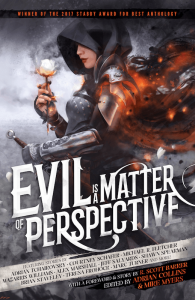 “Dead Sea Fruit” is science-fictional in that it looks at the worst case scenario of eating disorders. It imagines a man whose kiss makes everything you eat taste of ash, and young girls seek him out, wanting never to eat again. Research for this story took me to some very dark places. I looked at long term affects of poor diet, and at causes of a lack of appetite. I wanted that element of it to ring true.
“Dead Sea Fruit” is science-fictional in that it looks at the worst case scenario of eating disorders. It imagines a man whose kiss makes everything you eat taste of ash, and young girls seek him out, wanting never to eat again. Research for this story took me to some very dark places. I looked at long term affects of poor diet, and at causes of a lack of appetite. I wanted that element of it to ring true.
“In the Drawback” was inspired by way the tide draws back before a tsunami, and is set in a post-climate change world. While I don’t explore that part of it, I do provide a monster in the form of a giant, drowned with his mouth sewn shut.
“The Coral Gatherer” is about a lonely woman who builds a lover out of coral. I was fascinated to learn that coral can be used for bone grafts, because the make-up of the two things is similar.
For “Winter Sweet, Winter Grieve”, my story in a recent issue of Grimdark Magazine, I wanted to capture the feel of a fairy tale gone bad. So this giant living underground, collecting the bones of his victims is more fantasy than science fiction, but that merging of two genres can work as well, I think.
In the end, Horror shouldn’t ever be limited by constraining concepts of what it is. If it makes you feel bad, then it’s horror, whether it’s set on a spaceship or a haunted house. It’s important to allow elements of all genres to creep in if they need to, and I mean romance as well, and certainly crime. Stories should be layered so that we’re not telling them in a shallow way, but looking beneath the surface to find the rocks and murk and maybe even treasure below.
The post Crossing the Monster appeared first on Grimdark Magazine.
July 12, 2021
REVIEW: The God is Not Willing by Steven Erikson
I received a review copy of The God is Not Willing in exchange for an honest review. Thank you to Steven Erikson and Bantam Press. I don’t believe my review contains spoilers, but with releases this anticipated I tend to include a minor spoilers may follow warning.
Set approximately ten years after the events that concluded The Crippled God (MBOTF #10), The God is Not Willing returns readers to Northwest Genabackis, specifically Silver Lake. In House of Chains (MBOTF #4), the warriors Karsa Orlong, Delum Thord, and Bairoth Gild ventured here to cause havoc. Now, less than twenty Malazan marines have been sent to investigate stirrings in the North, bringing them to the garrison at Silver Lake. The tribes of the Teblor are setting their sights on the South and in addition to these thousands of warriors, something cataclysmic approaches Silver Lake too.
 I feel the need to mention early on in my review that Karsa Orlong does not feature in The God is Not Willing. Now referred to as The Shattered God, Karsa resides in a dwelling outside Darujhistan, being generally morose and miserable and refusing the affections of those who revere him.
I feel the need to mention early on in my review that Karsa Orlong does not feature in The God is Not Willing. Now referred to as The Shattered God, Karsa resides in a dwelling outside Darujhistan, being generally morose and miserable and refusing the affections of those who revere him.
In The God is Not Willing the main characters are the “knifey-mage” Stillwater, Oams, who may or may not be a Claw assassin, the last and arguably the least of the Bridgeburners, Spindle, and the young half-Teblor Silver Lake resident, Rant. He’s the bastard son of Karsa Orlong and was conceived during a rape a decade and a half ago.
Two of my favourite characters in The God is Not Willing were Rant and Spindle. We’re introduced to Rant as something pretty harrowing happens to him, a scene that may be upsetting for quite a few readers. Throughout the novel, he develops and changes a lot, goes through a plethora of feelings, yet there’s still much potential for further growth and innocence to lose. Quite early on in the book Spindle graces the pages, a character that I vaguely remembered from my time reading Memories of Ice (MBOTF #3) and Toll the Hounds (MBOTF #8), so I was pleased to see a player that I recognised being in the mix here. Spindle is calm and unshakeable, probably the most experienced Malazan marine still active in this era, although none of his squad believe he was actually a Bridgeburner, whereas Rant is raw, emotional, and confused. In a way, Erikson could be presenting us the old school and the new school of this world through these two characters, their differences, and their world views, and I was intrigued throughout to see whether or not their paths would cross.
Although Karsa doesn’t feature, his actions and legacy can be felt throughout, especially witnessed from the views of the Teblor contingent of the Dramatis Personae which includes two of Karsa’s daughters, Delum’s son, and Bairoth’s widow and her daughter. Even the Malazan marines are aware of the events that occurred at Silver Lake many years before and about Karsa’s ascendancy.
I finished my read of Malazan Book of the Fallen about five years ago and I rate it one of my top two fantasy series. My expectations for the first novel in the Witness trilogy were high but I tried my best to keep them leveled to avoid disappointment. The God is Not Willing is as good as I expected it to be. A solid 8/10 and an admirable first entry. Erikson continues to showcase his talents as an impressive wordsmith who I believe sprinkles the perfect amount of humour and camaraderie to balance the darkness and impending doom. Frequently, especially in the second half of the novel, I found certain scenes and set-pieces to be almost hypnotic with the way they drew me in, being equally mesmerising and memorable. Add to this intense battles, witty banter, advanced warfare, new curses, new gods, and escapades with warrens and this world’s supernatural and you’ll see why I had such a good time with this book.
There were also some very neat and unexpected, albeit brief cameos by a handful of major players from the main series. To mention who would be to spoil, but I can’t help but think these were more thank yous or easter eggs to Malazan fans rather than significant to the plot. I hope I am wrong though, as would love to see some of these players get more page-time in the rest of the trilogy. There is a lot of depth to this world as Malazan readers will already be aware and this novel rewards people who know what has come before. I couldn’t help but chuckle or smile at occasions such as a character saying “it’s not a couple of Necromancers is it?”
Could you start your Malazan experience with The God is Not Willing? I honestly don’t know. This is my sixteenth book in the shared world of Erikson and Esslemont so I’ve built up a decent knowledge of the way this world works. That being said, I did find this an easier, more succinct and streamlined read than the main series though, with a reading experience similar to the excellent Path to Ascendency novels.
The God is Not Willing is a worthy next step after the mighty Malazan Book of the Fallen. Not as grandiose in scope but still packed with the qualities that I previously adored. It features a heavy body count but has lots of heart at its core. I’d also like to add that I admire everything about the cover artwork and how it relates to events in the book.
Read The God is Not Willing by Steven Erikson
The post REVIEW: The God is Not Willing by Steven Erikson appeared first on Grimdark Magazine.
July 11, 2021
REVIEW: Ten Low by Stark Holborn
Chaos reigns at the edge of the universe. Ruling in second are all the outlaws. Ten Low by Stark Holborn is the story of an ex-convict known as Ten, and her desperate plight for redemption.
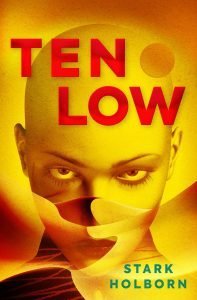 Ten Low takes place on the desolate moon, Factus. This barren land is scarcely habitable, but surviving its harsh terrain is only the first battle. Yellow rot plaques its inhabitants. Organ-stealing cults hunt the rest. There is a force or demon that manipulates the fate of those living here, distorting reality and possibility. Only those with no other choice would dare seek refuge in this wasteland. Yet here, Ten hides from the Authority of Accorded Nations and the bounty on her head.
Ten Low takes place on the desolate moon, Factus. This barren land is scarcely habitable, but surviving its harsh terrain is only the first battle. Yellow rot plaques its inhabitants. Organ-stealing cults hunt the rest. There is a force or demon that manipulates the fate of those living here, distorting reality and possibility. Only those with no other choice would dare seek refuge in this wasteland. Yet here, Ten hides from the Authority of Accorded Nations and the bounty on her head.
Ten lives for a tally. Using her skills as a medic, her life mission is to save as many lives as possible. She keeps track of this number, counting each life as if her very own depended on it. At first, her criminal past is shrouded in mystery. We don’t know the full extent of her charges nor why she is compelled to this penance. Her guilt-ridden conscious rarely permitting her to self-reflect, we only get scraps of history to piece together throughout Ten Low. I loved learning more about this conflicted character.
Ten Low begins when Ten witnesses a ship crashing from the sky. She scours through the wreckage and rescues a young girl. To Ten’s dismay, she discovers that not only does this girl belong to the Accord, but she is a General from the Minority Force. A group of genetically crafted super soldiers designed to be the Accord’s greatest asset. They discover the crash was no mere accident, the young human weapon is now the hunted.
“How to explain to this child, who is no longer a child, that the tally is all? That it matters over compassion or fear, that it drives me more than the threat of arrest ever could?”
Ten Low is bleak. The novel challenges us to question whether we control our own lives. It destroys romantic ideologies and replaces them with the importance of atonement. The real story begins when everything seems impossible.
From the quarter of this book and on, the pace of Ten Low is light breaking. I’m not sure if I read or inhaled all the grit and twisted turns of this novel. Its story is a violent course of Dune and Mad Max. I hope we see more of Ten in a sequel. Her story is captivating and ended far too soon.
Read Ten Low by Stark Holborn
The post REVIEW: Ten Low by Stark Holborn appeared first on Grimdark Magazine.



